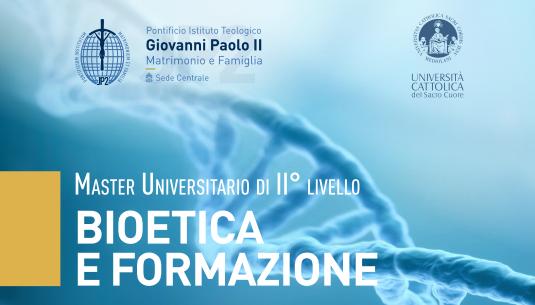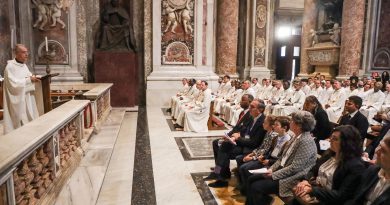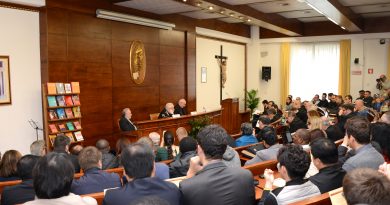MASTER’S in BIOETHICS and EDUCATION
Each human being is called by God to enjoy the fullness of life; and, is entrusted to the maternal care of the Church, every threat to human dignity and life cannot but have an effect on her heart, on her maternal ‘womb’. To defend life is not an ideology for the Church. It is a reality; a human reality which involves all Christians, precisely because they are Christian and because they are human. […] The message of the Encyclical Evangelium Vitae is thus more current than ever. Aside from the emergencies like the one we are experiencing now, it is a case of taking action on the cultural and educational level in order to transmit to future generations, the attitude of solidarity, care and welcome, in the full knowledge that the culture of life is not the exclusive heritage of Christians, but rather belongs to all those who, working to build fraternal relationships, recognize the value of each person, even when they are fragile and suffering.
(Pope Francis, On the 25th anniversary of Evangelium vitae, March 25, 2020)
PRESENTATION
St. John Paul II in the Encyclical Evangelium vitae focused attention on the urgency of a grand strategy in favor of human life: a profound “cultural” turn, to promote a “culture of life,” not only in terms of theoretical reflection but above all in terms of the concrete forms of living. In the face of the enormous positive possibilities of science in favor of life, but also of the unprecedented threats, it is a matter of “permeating all cultures and animating them from within” so that they care for and express the whole truth about man and his life.
The Pontifical Theological Institute for the Sciences of Marriage and the Family and the Institute of Bioethics and Medical Humanities of the Catholic University “Sacro Cuore” (Rome) accept this pressing invitation of the Pope, offering a rigorous and interdisciplinary academic formation aimed at taking on the burning issues of the present day within the framework of fundamental anthropological, ethical and juridical references. Indeed, small isolated answers and partial solutions of individual cases are not enough. It is necessary to keep our gaze open to the complete truth of man, which is revealed to us in Christ.
This is the novelty of the proposal of the Master’s in Bioethics and Education and the fruitfulness of the collaboration between our two Institutes. The decades-long, rich and pioneering experience in Italy of the Institute of Bioethics at the Catholic University, in contact with the most burning issues in medicine and in international dialogue, meets with the contribution of the Pontifical Theological Institute John Paul II.
Issues concerning human life, from its conception to death, from illness to its care, are read and critically studied in the context of family relationships and the relationship between generations, within the profound scientific and technological changes that characterize the practice of medicine today:
The family has a special role to play throughout the life of its members, from birth to death. It is truly “the sanctuary of life: the place in which life-the gift of God-can be properly welcomed and protected against the many attacks to which it is exposed, and can develop in accordance with what constitutes authentic human growth”. (Evangelium vitae, n. 92).
Master’s in Bioethics and Education
- Duration: 2 part-time academic years (60 ECTS).
- Admission requirement: degree certificate (specialized or continuous degree – old system – or equivalent degrees issued abroad and accompanied by declaration of value) in original.
- Objectives:
- To offer rigorous and interdisciplinary academic training on issues concerning interventions in human life in the age of technology, placing them within the framework of fundamental anthropological, theological-moral and legal references;
- To provide the appropriate tools to place bioethical issues in various educational (aiming at the training of trainers) and consultative (ethics committees, ethical consultations) contexts.
- The curriculum consists of 5 areas of training, with lectures, tutorials and personal online work. It provides for a final examination for the Master’s degree.
- Academic program 2022-2024
- Area of anthropology, ethics and law
- Area of special bioethics (beginning-of-life, end-of-life, genetics)
- Area of applied ethics
- Area of communication
- Area of education
- Download the brochure of the Master’s program in Bioethics and Education
Further Information
Dott.ssa SUSANNA BEFANI
Pontificio Istituto “Giovanni Paolo II”
Piazza S. Giovanni in Laterano, 4
000120 Città del Vaticano
Tel. (+39) 06 698 95 535
Fax (+39) 06 698 86 103
E-mail: master@istitutogp2.it




